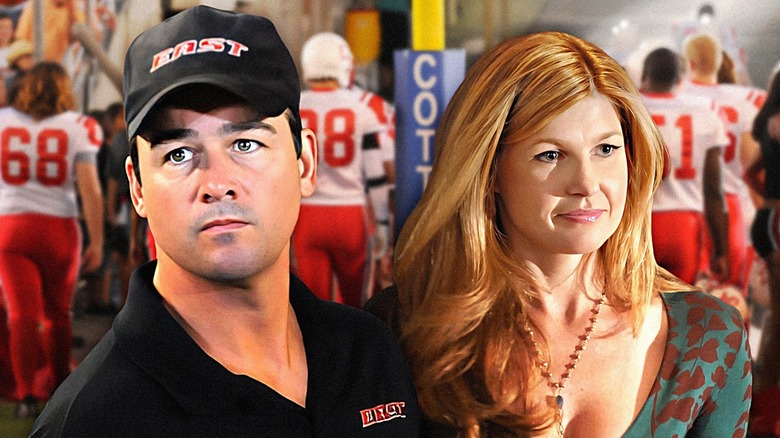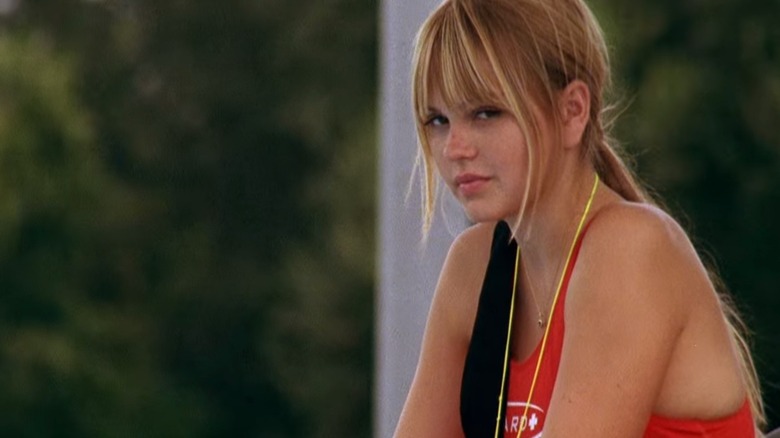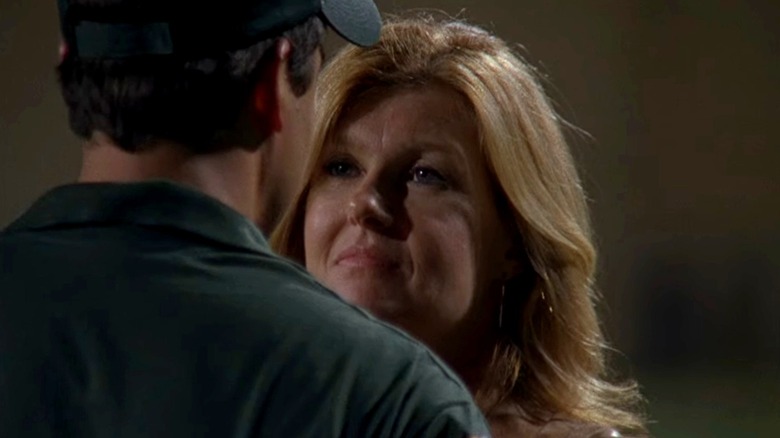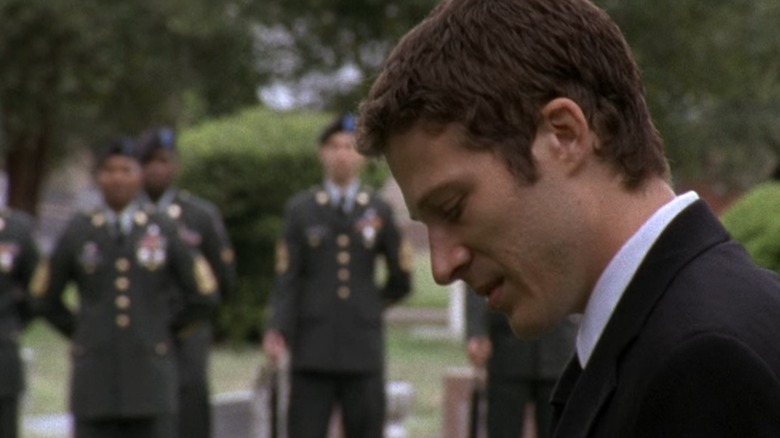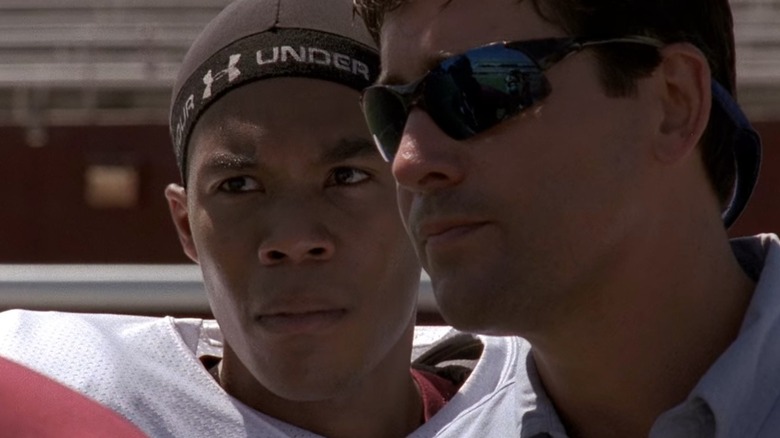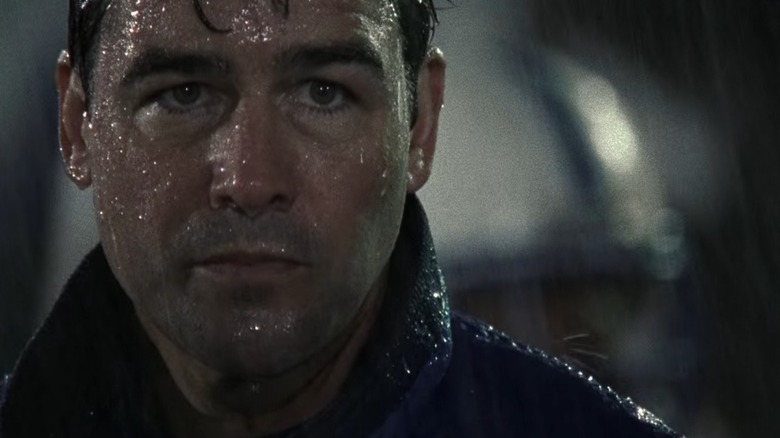Every Season Of Friday Night Lights Ranked
"Friday Night Lights" holds a unique spot in America's collective pop cultural memory. Those who haven't seen the show (which is based loosely on H.G. Bissinger's book of the same name) typically don't seem to be in a hurry to watch it, even though the drama is consistently included in rankings of the best TV shows of all time. It doesn't matter that "Friday Night Lights" won 3 Emmys, that it features great performances from stars like Connie Britton, Jesse Plemons, and Michael B. Jordan, or that it includes an incredible episode written by the future creator of "Interview with the Vampire." It is, to many of the people who haven't seen it, just a show about football.
Except it's not. Fans of the Texas-set show will tell you that though the sport is technically at the center of the series, it's about pretty much everything but football, including but not limited to: parenting, toxic masculinity, first love, the fractured American dream, empathy and generosity, child stardom, childhood trauma, Bible Belt conservatism, and the painful adjustment of expectations that often comes with growing up. People who love the show don't just love it, but treat it as a lifestyle. Its messages have been co-opted for church sermons and political statements, and references to the Dillon Panthers have appeared in everything from "The Good Place" to "Overwatch."
"Friday Night Lights" may not have a massive fandom, but its fans love it with their whole heart, because thanks to its formal realism and deep sense of humanity, it's the very rare show that feels like it loves us back. Here's our ranking of every season, from the one that could arguably be cut from the team, to several state champion-level winners.
5. Season 2
Don't let anyone tell you that season 2 of "Friday Night Lights" is all bad. The show's maligned sophomore season, which suffered due to a shortened TV cycle (it coincided with the 2008 WGA strike), features a few gems in the rough, including a ridiculously fun-dumb episode in which beloved all-American himbo Tim Riggins (Taylor Kitsch) moves in with the Taylor family in the aftermath of a tornado. There's also more focus on Smash Williams (Gaius Charles), the Dillon Panthers' star running back who's faced racism and financial setbacks on the road to playing college ball. Plus, season 2 has a painfully realistic postpartum depression plot, a Tami (Britton) and Tyra (Adrianne Palicki) team-up, and an "Y Tu Mama Tambien" homage episode that sees Tim, Lyla (Minka Kelly), and Jason (Scott Porter) bury the hatchet on their love triangle during a boozy trip to Mexico.
Unfortunately, these are pretty much the only high points in a stretch of episodes that trade in the first season's powerful, emotion-driven storytelling for a level of melodrama and bad decision-making that often beggars belief. A plot in which Landry (Plemons) and Tyra attempt to cover up the killing of Tyra's stalker has become emblematic of everything wrong with this season, and it's a jarringly phony outlier in an otherwise grounded show. While no other subplot is quite as stupid as that one, season 2 also doesn't know what to do with several key characters, relegating both Matt (Zach Gilford) and Julie (Aimee Teegarden) to insufferable, ill-advised rebound relationships while Buddy Garrity (Brad Leland) plays out a cringe-inducing white savior plot that suddenly disappears between seasons.
4. Season 5
Every season of "Friday Night Lights" besides the second is incredible, and the final go-round is no exception. If fans were nervous to see Coach Taylor (Kyle Chandler) move to the East Dillon Lions in season 4, by the fifth season it's clear that the series made the right call. Introducing a second generation of characters is a real gamble, yet "Friday Night Lights" managed to make its newbies as lovable as the original cast — which is a good thing, as several key stars from the early seasons are gone for good by season 5. Those who remain include Julie Taylor, whose first attempt at college goes off the rails quickly, and Riggins, who spends part of the season in prison for a crime his brother committed. Meanwhile, the show puts a crack in the middle of Tami and Eric's relationship for the first time, resulting in what might be the series' most painful plot arc.
While it's tough to watch these OG characters struggle, there was never any real question that a show as soulful and compassionate "Friday Night Lights" would stick its landing. Series finale "Always" is not just the best episode of the season, but likely the best of the series as a whole (with respectful apologies to "The Son"). It's a generous, authentic ending that allows every character a resolution that feels just right for them, from Riggins' plot of land to Coach's new job to Matt and Julie's marriage. The show began with these characters defining success according to their parents, coaches, and classmates, and ended with each of them understanding what personal happiness actually looks like to them.
The episode makes a meal out of its final football game, building it up so that the Lions' last shot at a state title feels as vital and real as if we were seated in the audience ourselves, tracking the path of Vince's (Jordan) game-deciding throw alongside all our friends. It's just a shame we had to say goodbye to them afterwards. As Riggins would put it, "Friday Night Lights" really touched God this time.
3. Season 4
In lesser hands, season 4 of "Friday Night Lights" would have been a "rebuilding" season in the worst way. Yet its decision to split Dillon down the middle turned out to be one of the best things to ever happen to the series. Down several former stars, the season kicks off in unfamiliar territory with what amounts to a soft reboot: Coach Taylor is no longer leading the Dillon Panthers, but instead has to wrangle the underestimated, untrained East Dillon Lions into a manageable team.
It's a delight to watch the even-keeled mentor and father figure build a new found family from scratch, and to watch the show steadily move beyond the cliched "wrong side of the tracks" designation East Dillon receives early on. The new cast, led by a pre-"Black Panther" Michael B. Jordan, is also extremely solid. Jordan's Vince Taylor is an underdog worth rooting for, while other fresh faces including Jess (Jurnee Smollett) and Becky (Madison Burge) are equally endearing.
The show benefits from its decision to focus more on the lives of Black players and students, whose perception of the show's fictional setting is much different than their wealthier, mostly-white neighbors at Dillon High. "Friday Night Lights" takes place against an obvious conservative backdrop, but the fourth season is its most socially conscious, tackling not just wealth inequality and race but also abortion, war, and the broken justice system. The show couches all of its moralizing in realistic dialogue and deeply human messiness, all of which is on full display in masterpiece episode "The Son." The Matt Saracen-focused chapter offers a career high point for Gilford, who sinks into the thorny grief of a character who just lost his absent father. It's an absolute must-watch hour in a series that's full of them.
2. Season 3
While plenty of other teen shows have come up with excuses to keep characters who are aging out of the original premise around, "Friday Night Lights" follows its original leads to their stores' natural end points, resulting in a series of beautiful goodbyes that make up season 3. This is the season that begins with a painful reality check of a time jump — one that leaves Smash injured, Landry and Tyra broken up, and the Dillon Panthers brought down to earth by a late-season loss. Yet the show's writers clearly rallied in the wake of season 2, putting everything they could into redemptive yet grounded farewell arcs for Jason, Smash, and Riggins (who would, of course, return later after ditching college). Each character gets his own goodbye episode, and all three include lovingly written, masterfully acted full-circle moments for the original Dillon Panthers.
Season 3 isn't without its faults: it devotes a ton of time to newcomer J.D. McCoy (Jeremy Sumpter) and his dad, Joe (D.W. Moffett), and their overarching plot grows tiring. In a show full of bad parents, Joe is one of the worst, though the storyline grates a bit less once the full picture of the pair's relationship has been revealed. While the football of it all isn't quite as compelling as usual this season, though, the off-the-field drama is more rewarding than ever. Several on-and-off romances finally fall into place this season, from Lyla and Tim to Matt and Julie, and it's great to see all these stressed-as-hell young people relax into bliss for once. A return to form that stays grounded and yanks on our heartstrings at every turn, season 3 ends with a bold cliffhanger as Coach Taylor is moved to East Dillon.
1. Season 1
"Friday Night Lights" kicks off with a lot of football. The show's pilot episode follows our cast of characters through the week leading up to the first game of Eric Taylor's first season coaching the famed fictional team in a religious Texas town, and it culminates in what is likely the longest gameplay sequence in the show's 76 episodes. Get through it, though, and you'll be rewarded with an astonishingly emotional ending — one that deftly reveals the show's heart and its knack for reaching our own.
The injury that paralyzes Jason Street is the inciting incident that sets up a season's worth of tears and triumphs. The town's reaction to the event also establishes the archetypes — girl next door, bad boy, arrogant star player, underdog — that the show will deepen and subvert over its next five seasons. "Friday Night Lights" may play with cliches, but its first season also establishes a deep, near-documentary verisimilitude cultivated by a production style that valued organic storytelling. Houses were used as sets, blocking was minimal, and actors filmed without rehearsals from scripts used primarily as guidelines. The result is the most real-feeling drama series of the 21st century, a story in which every high and low feels personal and close to home — especially once W.G. Snuffy Walden's unforgettable score kicks in.
Not everything in season 1 of "Friday Night Lights" stands up to scrutiny today, but it's a viewing experience that feels less like watching a TV show and more like falling in love. The production's documentary-like elements would be nothing without a talented cast and sharp writing, and the show proves it had both right off the bat. Whether we're watching Coach Taylor build his field of dreams in "Mud Bowl," wincing over Tim Riggins' failed attempts at sobriety, or cheering on the Panthers in the state championship game, season 1 of "Friday Night Lights" is a profound, emotionally engrossing viewing experience like no other. By the time Coach Taylor says it for the third or fourth time, it's impossible not to welcome the show's unapologetically earnest mantra into our hearts, too: clear eyes, full hearts, can't lose.
